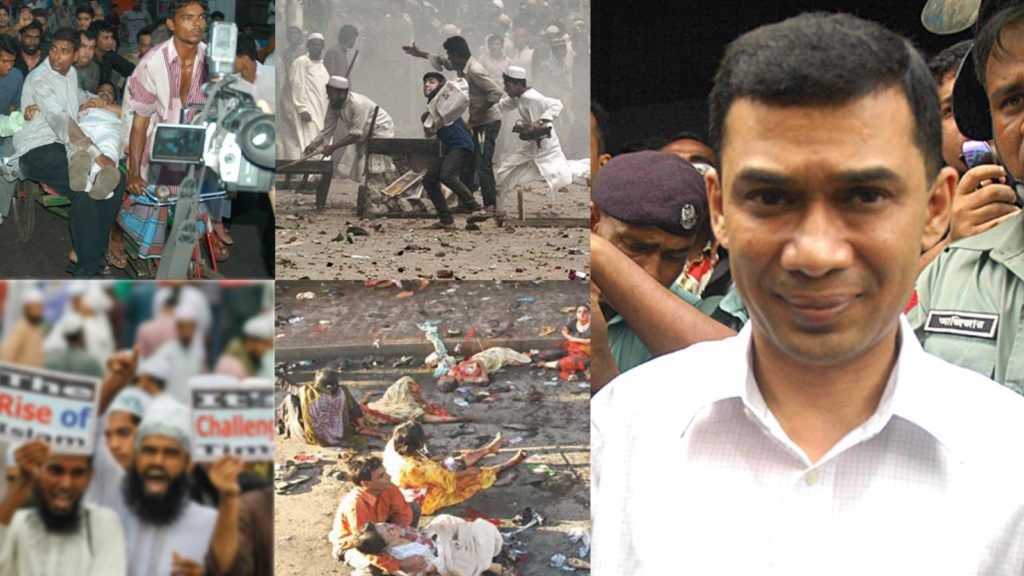
The Bangladesh Nationalist Party leader’s lobbying endeavors overshadowed by a shocking court verdict
Tarique Rahman, a prominent figure within the Bangladesh Nationalist Party (BNP), has recently faced scrutiny for his extensive lobbying activities in the United States, United Kingdom, and various European nations. However, beneath the glitz and glamour of his lobbying endeavors lies a disturbing revelation—Tarique Rahman stands convicted as a terrorist. In this article, we delve into the court’s shocking verdict, which uncovers Rahman’s direct involvement in a devastating grenade attack, as well as his alleged role in fostering insurgency within neighboring India.
Unveiling a Sinister Plot:
On that fateful day of August 21, 2004, at the behest of Tarique Rahman, terrorists associated with the BNP and militant outfits such as Harkat-ul-Jihad (HuJI) executed a series of grenade attacks, deliberately targeting Sheikh Hasina and key Awami League leaders. The court’s verdict brought to light a meticulously planned scheme that exploited the corridors of state power. Alongside several high-ranking BNP officials and former intelligence personnel, Rahman was found guilty and handed varying sentences for their direct involvement in the ghastly attacks. Tragically, the bombings claimed the lives of 24 innocent individuals and left countless others maimed.
Abuse of State Machinery:
The conviction of influential politicians, senior police officials, and prominent HuJI militants served as a stark reminder of the calculated manipulation of state machinery to execute the attack while thwarting subsequent investigations. According to the court’s findings, specialized Arges grenades, typically used in wartime, were detonated at the heart of the Awami League’s central office with the active assistance of state apparatus. The prosecution successfully presented evidence demonstrating that the accused had meticulously planned and coordinated the grenade attack, leaving no doubt about the premeditated nature of their actions.
Continuation of a Dark Conspiracy:
The court’s verdict shed light on an alarming revelation: the August 21, 2004 grenade attack was not an isolated incident but rather an integral part of a larger conspiracy. It was a continuation of a sinister plot that unfolded after the assassination of the Father of the Nation on August 15, 1975, when four national leaders were mercilessly murdered within the confines of a jail. The court’s findings uncovered a malevolent endeavor aimed at rendering the Awami League leaderless, with the grenade attack serving as a crucial juncture in this devious scheme.
Hawa Bhaban Meeting:
Compelling testimonies from witnesses unveiled Tarique Rahman’s presence at Hawa Bhaban, a notorious alternative center of power associated with the BNP. Witnesses, including a member of an Islamist outfit named Al-Markazul Islami Bangladesh, affirmed Rahman’s participation in a meeting where he met with BNP and Jamaat-e-Islami leaders, alongside top intelligence officials. Allegedly, during this meeting, administrative support was pledged, providing a green light for the perpetrators to carry out their malevolent agenda.
Suspicions of Involvement in Insurgency:
Tarique Rahman’s alleged involvement in insurgency activities extended beyond the borders of Bangladesh, raising serious concerns about regional security. Major General Gaganjit Singh, former Deputy Director General of India’s Defense Intelligence Agency (DIA), implicated Rahman as the mastermind behind a significant arms haul in Chattogram in 2004. Singh contended that the BNP-Jamaat alliance facilitated the supply of arms not only to the United Liberation Front of Asom (ULFA) but also to several other rebel groups in India’s northeast. This calculated move aimed to destabilize the region while exploiting Bangladesh as a safe haven.
Tarique Rahman’s glamorous lobbying pursuits have brought into sharp focus a haunting past tainted by his conviction as a terrorist. The court’s damning verdict, bolstered by testimonies from credible witnesses, has laid bare Rahman’s direct involvement in a devastating grenade attack, as well as his alleged complicity in insurgency activities. As the world grapples with evolving security challenges, it is imperative to uncover individuals who exploit their positions, jeopardizing the safety and stability of nations.






